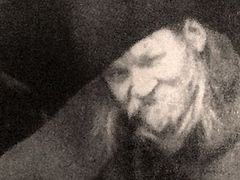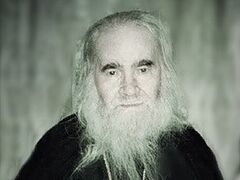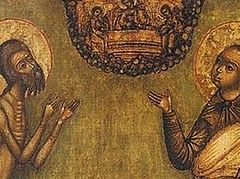 Archimandrite Adrian (Kirsanov) and Professor Alexey Ivanovich Sidorov
Archimandrite Adrian (Kirsanov) and Professor Alexey Ivanovich Sidorov
Liudmila Alexandrovna from Pechory
I met Ludmila Alexandrovna in the town of Pechory in 1981. She was renting a room from the same lady as I. She was probably God’s answer to my prayer when I appealed to Him as soon as I became a Christian:
“Lord, show me the best part of Orthodoxy, the most genuine part, for I desire no fakeness. You know how I loathe hypocrisy!”
It was my first conscious prayer, and since the Lord is especially well disposed to neophytes, He always satisfies their requests to strengthen them in their faith. Well, Liudmila Alexandrovna was a beggar who begged alms on the church porch, and that’s how she made her living. I learned about it only a few days later, even though I took note of her when I saw her for the first time. How could one not notice her? Liudmila Alexandrovna was a lively, skinny old lady with a sharp, penetrating gaze; her exceptionally bright mind fascinated all those who met her. I heard two or three sentences and I didn’t want to part with her, wearing her out with questions: “What is this for? Why is that? What’s the reason behind that?” Asking nothing and picking her words carefully, Liudmila Alexandrovna willingly answered my questions and soon I knew a few details about her life. Her mother was a pious woman who couldn’t attend church very often—she was a single mother who had to work all the time. But she made her daughter go to church as often as possible.
“It often happened,” recalled Liudmila Alexandrovna, “that I didn’t want to stay till the end of the service, but I couldn’t leave early—my mother would surely ask me, ‘Who celebrated the service, who came to hear confessions, what passage from the Gospel was read?’ I was also asked to retell the content of a sermon. That’s why I had to stay till the very end.”
Later on, she got used to being at church and willingly attended the services. But even though she was at church often, she didn’t live in full commitment to God’s will, just like many other people who separate church life from “life”, relying completely on themselves. So one day she was helping a girl who seemed to have trouble walking bring heavy bags to her house. On their way home, they got into conversation and Tatiana (that was her new friend’s name) invited Liudmila Alexandrovna to her home. After asking about her life, she suddenly embraced her and began to cry:
“But you don’t know our dear God at all!”
“What do you mean, I don’t know? Liudmila Alexandrovna, said, surprised. “I am a cradle Orthodox. I go to church every Sunday.”
“No, you don’t, you don’t know Him, because you never turn to Him, you never seek His help; you don’t know how good it is to be with Him. You have no idea what it is like to feel His love.”
“So, that’s what it’s all about!” Liudmila Alexandrovna said to herself. Admittedly, everything in her life seemed unsubstantial. She was divorced and her son had gone out of control long ago, living his own life. Her only consolation was her job—she worked as a daycare manager and she loved working with kids. She tried to find the reason why her life was so dull, but she could never arrive at an answer. “I think Tanya is right,” she thought. “I’ve suffered all my life because I couldn’t find its meaning; I’ve been unable to understand the main purpose of our existence. Is it only about making it to old age and then dying? No, there must be something else to it. But what? What do I need in order to live a meaningful life? For example, why do I go to church? Is it just another habit? Well, yes, I feel safe there. But once the service is over I suffer from loneliness and an incomprehensible yearning again.”
“But what should I do?” she exclaimed.
“You need to live differently, like an infant or an innocent child. All they know is how to listen to their mother and to hold her hand, because it is warm and they feel peaceful next to her. That’s how you should grab our dear God’s hand. Seek His advice every minute of your life. And after your heart learns to converse with Him through prayer, that’s when you will hear Him. What a joy it will be, you will feel so, so good, I can’t even explain it!” said Tatiana, looking at Liudmilla with her shining eyes. “Then you will need to find a spiritual father, you can’t live without one, his advice and prayers will assist you anytime your faith grows cold or you find yourself in sorrow. Of course, you need a spiritual father, by all means!”
When she got home, Liudmila Alexandrovna couldn’t come to her senses; she was trying to recall everything Tanya had told her. She was tormented by thoughts all night long and, by the next morning she decided to start a new life. As soon as she had made up her mind, she instantly felt warmth and peace settling in her soul. She turned to pray as Tatiana had taught her: “Lord, help me find You, do not let me perish without You!” The next day, she went to the Holy Trinity-St. Sergius Lavra, even though she lived far away from it.
“Why did you go there?” I asked.
“I don’t know,” she answered, “I guess it was my heart’s desire. Somehow, I knew for sure that it was where I had to go.”
How Fr. Adrian became her spiritual father
 Archimandrite Adrian (Kirsanov) On her way there, Liudmila Alexandrovna kept praying to the Lord to show her a father-confessor. She approached the very first priest she met and immediately asked him:
Archimandrite Adrian (Kirsanov) On her way there, Liudmila Alexandrovna kept praying to the Lord to show her a father-confessor. She approached the very first priest she met and immediately asked him:
“Batiushka, be my father confessor.”
“How can that be,” I interrupted her. “You asked the first priest you saw? Don’t you need to make sure somehow that he is right for you? I read that somewhere.”
“Of course, you should make sure that it is him; that’s why I prayed to the Lord to take me to one who was tried and tested. My only hope was in God. If you don’t pray, no matter whether you ‘check him out’ or not, you can still be mistaken. But God will not put your faith to shame. Nevertheless, batiushka told me at the time: ‘Why should you confess with me? Go see Fr. Naum.’
“I did what he told me because I already knew that he was the one, my father confessor. So it happened that Fr. Naum looked at me long enough to say: ‘No, you are not mine.’
“And he sent me back to the same batiushka I had just spoken to. I wasn’t surprised at all—I knew that’s how it was meant to be. So, I came back to him and said: ‘Batiushka, he said I am yours.’ ‘Mine?’ he said. ‘Well then you can come.’
“As it turned out, he was the renowned Elder Adrian (Kirsanov). I learned a lot about him later and was able to ‘check him out’ him many times—I had such an opportunity. And I thank God for such a confessor. When I had a month left before my retirement, I asked for his advice about it. He said, ‘Why do you need that retirement money? Give it up.’ ‘What do you mean, give it up?’ I asked. ‘What shall I do for a living?’ ‘It’s alright,’ he said. ‘You’ll survive without it.’
“That’s how I ‘survive’ without it. When Fr. Adrian was transferred to Pechory, I followed him, and it’s been fifteen years since I arrived here. I don’t need much: 1.50 rubles needed to rent a bed and one ruble for food per day. But I am so happy! I don’t need to worry about anything. All I truly need is to attend services and pray to God. I like reading the Psalter, especially the psalm about a beggar who feels dejected. It’s about me—I am also beggar.”
“What do you mean, a beggar?” I asked her again.
“That’s just what I mean. I’m a beggar, because I stand in front of the church begging. I live on charity.”
“Why didn’t I see you there?”
“There is no need for me to beg today. A girl gave me a ruble yesterday, and our Bishop blessed me with five rubles when he came to celebrate the feast. I only beg enough to collect 2.50 rubles a day. As soon I collect that much, I go to church. Other beggars ask me, ‘Why do you leave? You are proud.’ ‘Sure, I am proud, but pride has nothing to do with it. You should also attend church more often instead of worrying about getting more money,’ I retorted, but they wouldn’t listen. That’s fine, it’s their life; but for me there is nothing more precious than a church service.”
I was listening to Liudmila Alexandrovna’s story, feeling amazed at the beauty I unexpectedly encountered. This kind of beauty is the lot of a select few who can fulfill the commandment of God: Sell everything you have … then come and follow Me. It was a life that has fallen out of favor in our times because it brings mockery and humiliation of every possible kind on those who hold it dear. If we didn’t have these Ludka-the-fools (as Liudmila Alexandrovna used to call herself), the Orthodox faith would have lost its vitality and unmatched subtlety.
By the grace of God, I knew that at that moment I had encountered the eternally living Tradition of the Church, carried across the centuries—invisible to wary and alien eyes—but which is quintessential to Orthodoxy. It is the Tradition, the infinite depository of the Church. It can’t be seen with physical eyes or understood by the carnal mind. The living experience of Orthodoxy can only be perceived within the secret chambers of our hearts. So, Holy Tradition, the love pouring out in our world, over which the gates of hell will not prevail, will never cease as long we have those who are still willing to walk in the Apostle Paul’s footsteps, asking, Lord, what do You want me to do? Not only do they walk in those steps, they also fulfill what the Lord commands them to do. Living in obscurity, they perform acts of faith in secret for the sake of their love for the Lord, knowing that He loves them in return.
How can she spend her whole life like that?! Someone offered Liudmila Alexandrovna a nice winter coat. She refused it.
“Why didn’t you take it?” I asked, surprised. “You’ve got nothing to wear in the winter!”
“Winter is still a long way off.”
“But what if no one brings anything before then? What will you wear?”
“It’s alright, the Lord will provide.”
Two months later, I shared her story with a friend in Moscow who then sent Liudmila Alexandrovna a warm coat.
The Lord didn’t forsake her. But how powerful her faith must have been to rely on Him as much as she did! I want to add that her father confessor didn’t seem to appreciate her ascetic deeds; he never even called her by name. More than that—every time Liudmila Alexandrovna came for confession he’d ask her, “What’s your name?” as if he had never met her before. I don’t know if she would get upset about this or not. She had abandoned worldly life, and it meant she wasn’t part of it anymore—this was all that mattered. “Just God and me,” she used to say—and that was her only consolation…
What surprises me is that there are plenty of people like her in Rus’.[1] It isn’t an easy thing to meet them though. To see them, you have to become more like them—humbled and belittled—because they can’t be seen from the rarefied heights of our self-importance and self-will. By God’s providence, it happens either with neophytes or those who already know how to recognize them as poor in spirit. I was one of those neophytes at the time, and that is why I was given a chance, at least for a short time, to get up close and personal with the hidden mysteries of our faith.
To be continued…



